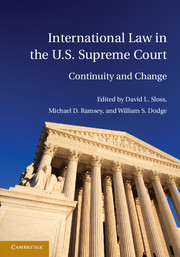Book contents
- Frontmatter
- Contents
- List of Contributors
- Table of Cases
- Acknowledgments
- Introduction
- PART I FROM THE FOUNDING TO THE CIVIL WAR
- PART II FROM THE CIVIL WAR TO THE TURN OF THE CENTURY
- 2 Treaties in the Supreme Court, 1861–1900
- 3 Customary International Law in the Supreme Court, 1861–1900
- 4 International Law as an Interpretive Tool in the Supreme Court, 1861–1900
- 5 A Social History of International Law: Historical Commentary, 1861–1900
- PART III FROM THE TURN OF THE CENTURY TO WORLD WAR II
- PART IV FROM WORLD WAR II TO THE NEW MILLENNIUM
- PART V INTERNATIONAL LAW IN THE U.S. SUPREME COURT IN THE TWENTY-FIRST CENTURY
- V.A TREATIES AFTER 2000
- V.B CUSTOMARY INTERNATIONAL LAW AFTER 2000
- V.C INTERNATIONAL LAW AND CONSTITUTIONAL INTERPRETATION AFTER 2000
- V.D INTERNATIONAL LAW AND STATUTORY INTERPRETATION AFTER 2000
- V.E INTERNATIONAL LAW AND THE WAR ON TERROR
- VI CONCLUSION
- Index
- References
5 - A Social History of International Law: Historical Commentary, 1861–1900
Published online by Cambridge University Press: 05 July 2011
- Frontmatter
- Contents
- List of Contributors
- Table of Cases
- Acknowledgments
- Introduction
- PART I FROM THE FOUNDING TO THE CIVIL WAR
- PART II FROM THE CIVIL WAR TO THE TURN OF THE CENTURY
- 2 Treaties in the Supreme Court, 1861–1900
- 3 Customary International Law in the Supreme Court, 1861–1900
- 4 International Law as an Interpretive Tool in the Supreme Court, 1861–1900
- 5 A Social History of International Law: Historical Commentary, 1861–1900
- PART III FROM THE TURN OF THE CENTURY TO WORLD WAR II
- PART IV FROM WORLD WAR II TO THE NEW MILLENNIUM
- PART V INTERNATIONAL LAW IN THE U.S. SUPREME COURT IN THE TWENTY-FIRST CENTURY
- V.A TREATIES AFTER 2000
- V.B CUSTOMARY INTERNATIONAL LAW AFTER 2000
- V.C INTERNATIONAL LAW AND CONSTITUTIONAL INTERPRETATION AFTER 2000
- V.D INTERNATIONAL LAW AND STATUTORY INTERPRETATION AFTER 2000
- V.E INTERNATIONAL LAW AND THE WAR ON TERROR
- VI CONCLUSION
- Index
- References
Summary
The history of international law is quietly flourishing. Lawyers are tending new shoots of scholarship – witness the bumper crop of work produced in this volume alone. Political theorists are nurturing a wonderful new literature on the theoretical history of the field. And after years of leaving the fields fallow, historians are rushing (belatedly) to harvest heaps of new insights.
The field of international law history is maturing so quickly that those who tend to it have barely had the opportunity to articulate its aims, its subjects, or its methods. There is some virtue in this, of course. The wild and unconstrained growth that occurs when the underbrush is first cleared – before the construction of the formal disciplinary trellises and latticework – can produce delightful and unexpected blossoms. It is tempting simply to shout “hooray.” Let a thousand flowers bloom. Yet as the sprouts turn into vines and before they root themselves too deeply in the soil, it may be useful to reflect on the project of doing history in the garden of international law.
Here at the beginnings of the field we can start to identify at least three different approaches or schools. Each is imminent in the literature as it now stands. The first approach – and I think far away the dominant one – is what we might call the insider doctrinal history approach. A second school consists of outsider doctrinal histories.
- Type
- Chapter
- Information
- International Law in the U.S. Supreme Court , pp. 164 - 188Publisher: Cambridge University PressPrint publication year: 2011
References
- 1
- Cited by



